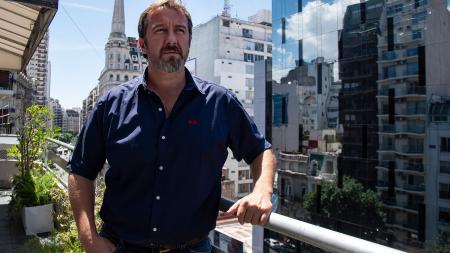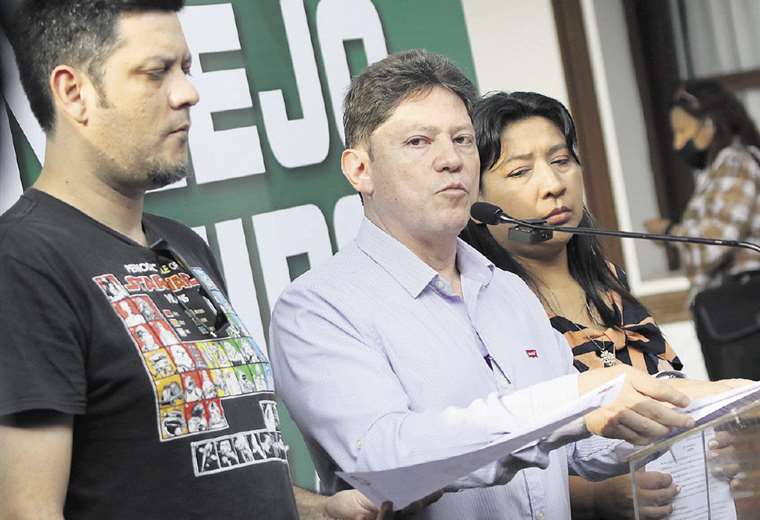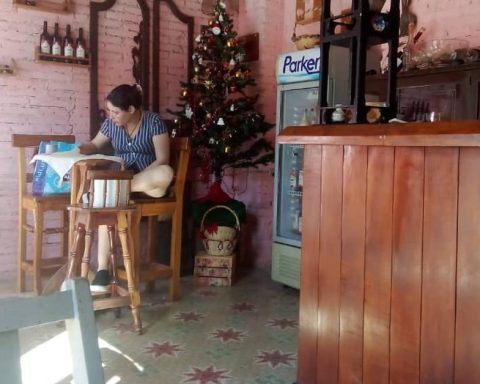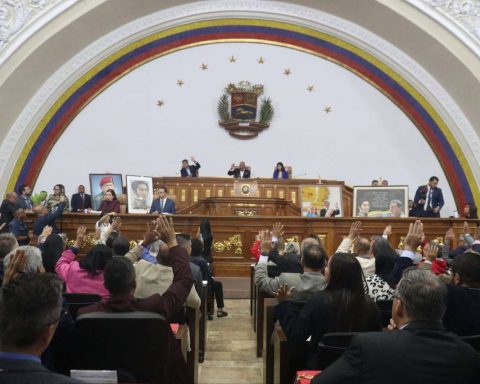Mario González, trusted that the financial assistance announced for the sector will allow it to face the significant losses that are expected in production due to climatic contingencies.
A few days after his inauguration, on March 4, during the traditional Breakfast of the public-private entity within the framework of the Harvest Festival in Mendoza, the producer from La Rioja pointed out that the damages caused by hail and frost were great and there are to accompany the producer.
BREAKFAST COVIAR 2023 ?
The most important event of Argentine Viticulture already has a date. A federal meeting that celebrates the industry and marks its growth and development agenda under the line of the 2030 Wine Strategic Plan. pic.twitter.com/TM7BFHr766
— COVIAR (@COVIAR1) February 8, 2023
In an interview with Télam, the head of the body that manages and articulates the actions necessary to meet the objectives of the Argentina Vitivinícola Strategic Plan (PEVI), expressed his support for continuing to bet on dialogue and consensus.
– You take over at a very challenging time for the sector.
– It is a complex year from the climatic and economic aspects; many variables that come together, but as good producers we are very optimistic and we always believe that the following year will be good; Interesting challenges to carry out with the very good Coviar teams.
– What do you think will be the consequences for production?
– We are just going to have the post-harvest reality; A priori, we know that the damage has been strong and that the drop in production is obviously going to be there; it’s going to be complex; It is necessary to see how the producer can be accompanied so that he does not fall and can continue the following year.

– A few days ago in La Rioja the Minister of Economy Sergio Massa made some announcements of assistance for the sector, particularly small producers.
– There were two important announcements; one, the Proviar II; and another, due to the frost issue, which in November, when they occurred, had already been implemented through a scheme that will reach each of the provinces; it is important that it has been implemented quickly; logically, financial tools are always insufficient; but we highlight how important was the speed with which action was taken at that time and now we are finishing seeing how it will be implemented.
This sector was affected by hail and late frosts, therefore, together with @JuanjoBahillo and to the team of @AgricultureAR We made State resources available to protect and accompany them at this time, with programs such as PROVIAR II and AGRO XXI, among others.
— Sergio Massa (@SergioMassa) February 8, 2023
– How much do the Proviar II funds amount to?
– In this second stage there are 40 million dollars, to which 10 million counterparts are added, that is, it is also an amount of 50 million dollars, like those of the first stage.
T: Are these funds enough?
MG: These funds are important above all to incorporate technology in the primary sector, small producers, not large surfaces; and they will allow us to take a little step; There is still a lot to do or improve, but it is a first step, particularly for small producers, who have the most difficulty obtaining financing.
– In the sector there is a great need for water works…
– The water problem is an important issue in the wine-producing provinces; that is why it is one of the strategic objectives of the Corporation and the Strategic Plan; without water we cannot produce; You have to work a lot on structural issues, on large works so that the water reaches the productive sector and intra-farm technification; we have to make the use of water as efficient as possible and for that we must have financing.
– The sector has advanced a lot in technology, such as drip irrigation, in recent years.
– Viticulture has advanced a lot, but there is still a sector that cannot take it, which is above all the smallest, the smallest; there the Proviar will play an important role; Another issue that is also extremely important is that of energy costs: the tariff is becoming an extremely important component in the operating costs of any producer, so the change in the energy matrix towards solar systems is extremely necessary, due to cost and environment; For this reason, another of the Corporation’s strategic themes is sustainability.

– Is there a good reception to sustainable production in the sector?
– Yes total; What has happened to us with this is that pressurized irrigation entered Argentina strongly in the 90s, but solar irrigation arrived a few years ago; there is still very little development; the large companies that have incorporated it, the results are optimal but you have to continue and for that you need financing.
– The wine sector differs from others for having developed a common project, the PEVI 2020 that was extended to 2030, but at the same time it shows differences. How is the relationship between Coviar and other entities?
– Within Coviar, the most representative entities of the sector are seated by law; each one has its agenda and that is how it has to continue being; Coviar in a designated institution to develop and carry out a strategic plan; understanding the roles of each one we should not have problems; We are open and it is necessary to work together, so that there are no problems and that those that do exist can solve them; Everything is possible with dialogue, where we agree we will move forward together and where we don’t, we will try to reach consensus. Coviar was born with consensus as the key to progress; perhaps that was lost a little bit and we have to resume it quickly; The most important thing is to know the role that each one of the institutions has and Coviar includes all of them, not only the private ones, but as a public-private entity, we have the possibility of developing strategies and discussions with the public entities that are close to us.
– What are your management objectives?
– We must continue betting on dialogue and consensus; to work towards an Argentine viticulture with all its nuances, which has 18 different provinces, with different products, climates and strategies, but trying to achieve a single strategy towards where we want to go as a wine country in ten years.
The results of lower grape production and the impact on prices
Mario González admitted that production losses in the sector due to climatic contingencies will impact values, but clarified that the value of grapes does not represent such a large percentage of the final product and warned about increases in other costs.
Télam: What do you think will be the consequences of climatic contingencies on production?
Mario Gonzalez: We are just going to have the post-harvest reality; A priori, we know that the damage has been strong and that the drop in production is obviously going to be there.
T: Do you think that the price for the producer will be recomposed due to this lower production?
MG: I have no doubts; The producer also has very high costs that have to be supported for a whole year, and I think that a year where the price may balance that situation and good results are achieved.
T: And will the price for the consumer increase?
MG The weight of the price of the grape in the final product is not so strong as to suggest that there is a very big jump, but if it is necessary to achieve a balance between inputs and prices to the producer, who must be taken care of, get him to cover his costs and be profitable because it is a lot of effort, a lot of people who work, a lot of manpower.
T: How do inputs influence?
MG A large component of the price of a bottle of wine is given by the inputs; the transfer of input costs is what ends up affecting the consumer; As an industry we would like to maintain a higher product value and a lower input value; It is an equation that we must continue to work on and try to make it more balanced.
T: In recent times there has been a lack of bottles, the increase in sea freight…
MG: We come from difficult years, complex from every point of view; since the pandemic, which benefited viticulture due to increased consumption in the domestic market, but at the same time made logistics more complicated, maritime freight increased exponentially; to that was added the war, inflation in other countries and climatic issues; A series of things accumulate that make the situation difficult, but the important thing is that many years ago winemaking drew up a long-term plan; With optimism we want to move towards achieving part of those objectives and we hope that this will be accommodated at some point.
T: One of the issues that worries the sector is that of costs.
MG: Costs -both at the field and industry level- have been growing at the same magnitude that most of those of any product in Argentina have been rising and that is logically a concern because the price transfer has a limit, the the purchasing power of the people; we always have a ceiling, both in the internal and external markets, where we compete with the main wine producers in the world.
T: What would it take to improve costs?
MG: The costs go hand in hand with the same inflationary process that the country is experiencing; Let’s hope it’s resolved quickly so that both our activity and the rest of Argentines have a balance.
T: At some point there was talk of importing raw materials and the government stated that they were not going to allow it…
MG: It is important that it has been raised at the national level; It is a subject that must be touched with great care; It is too hasty to think that there is going to be a lack of wine to make importation necessary and viticulture is not a business of buying and selling, but behind it there is a very large social and productive network, from small producers, winemakers, businessmen, merchants and else; you have to take care of that chain and that they all have positive results, try to balance; Now, if there are problems and there is no supply for the domestic market, it will be time to sit down and analyze it, but I think we are far from that situation.


















